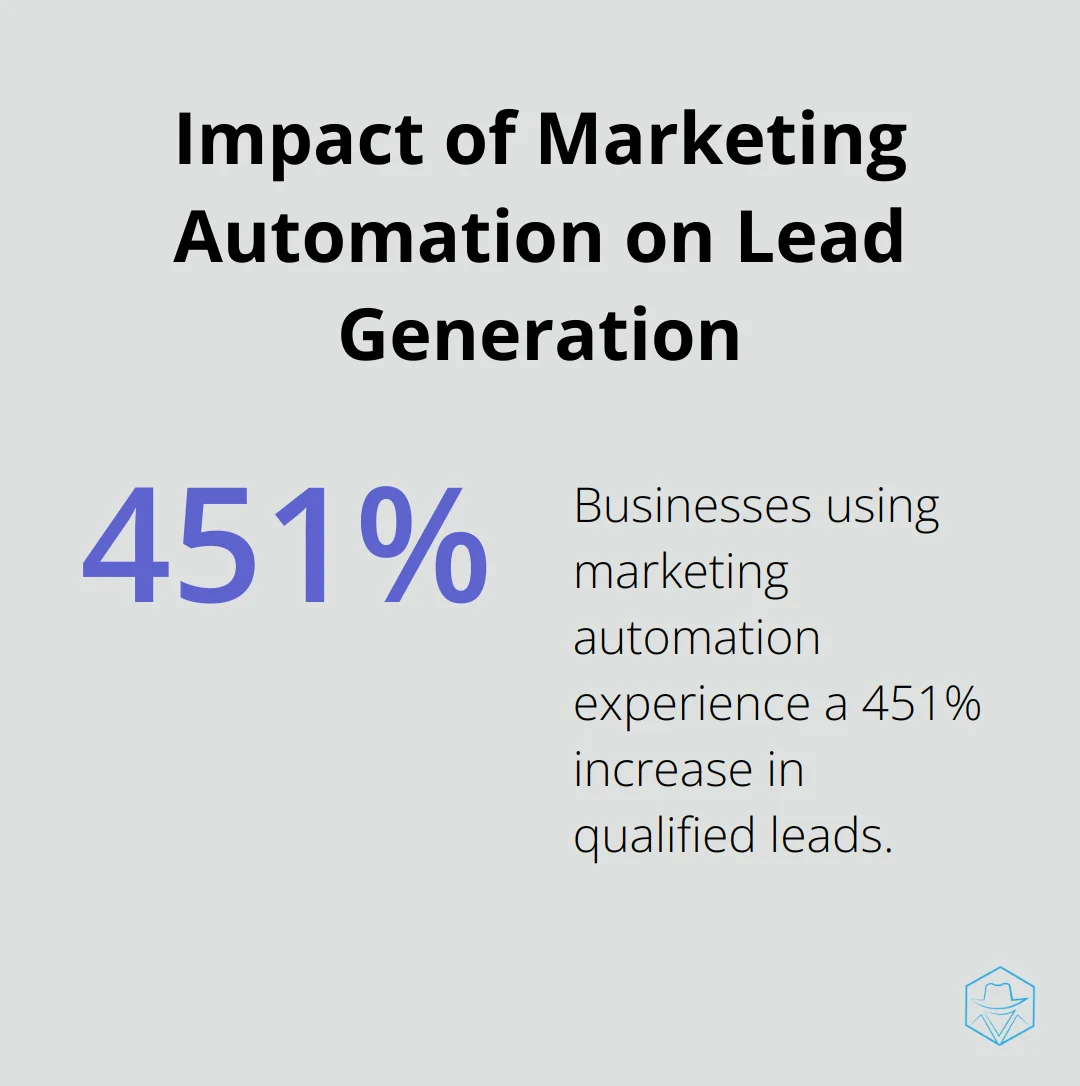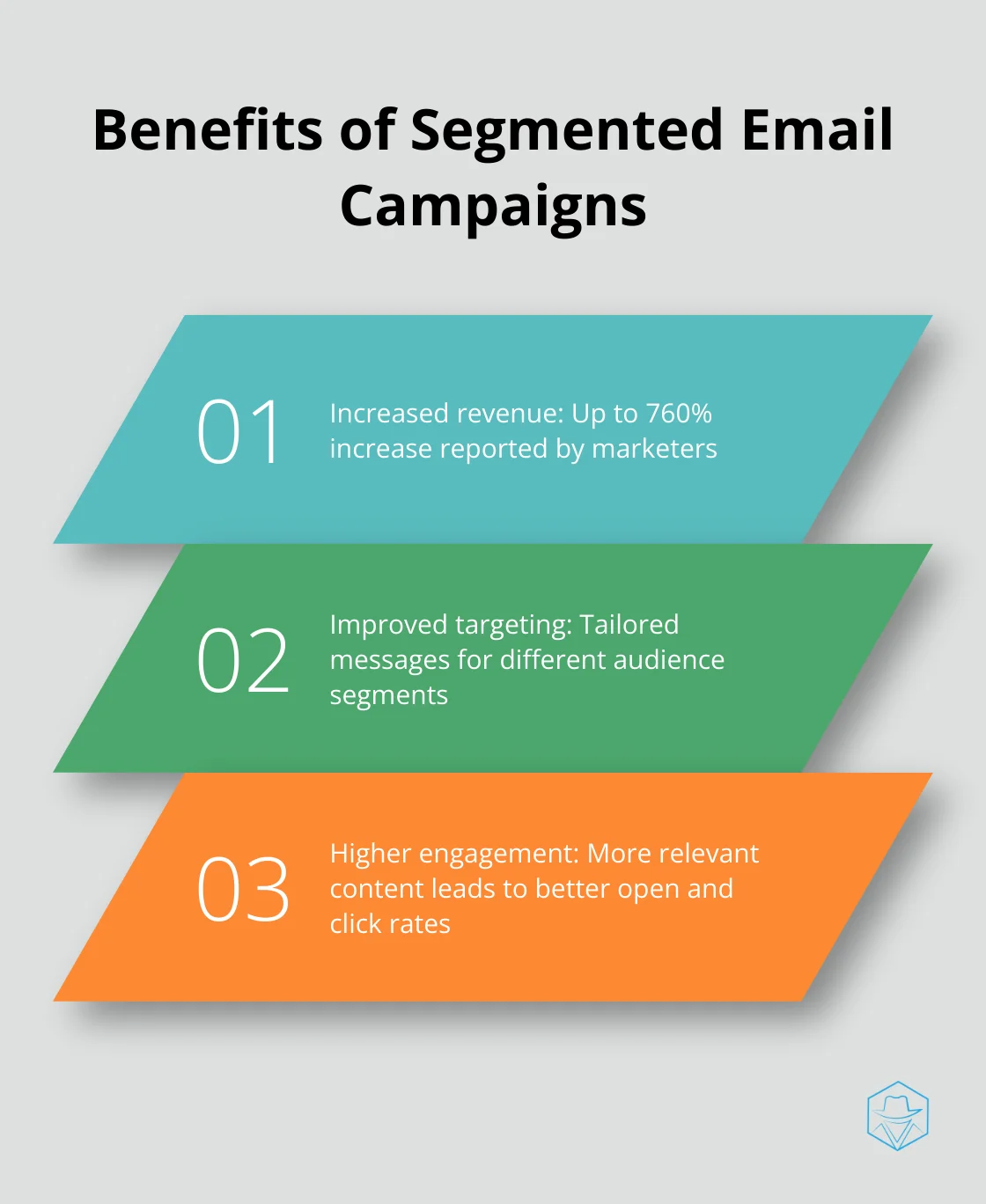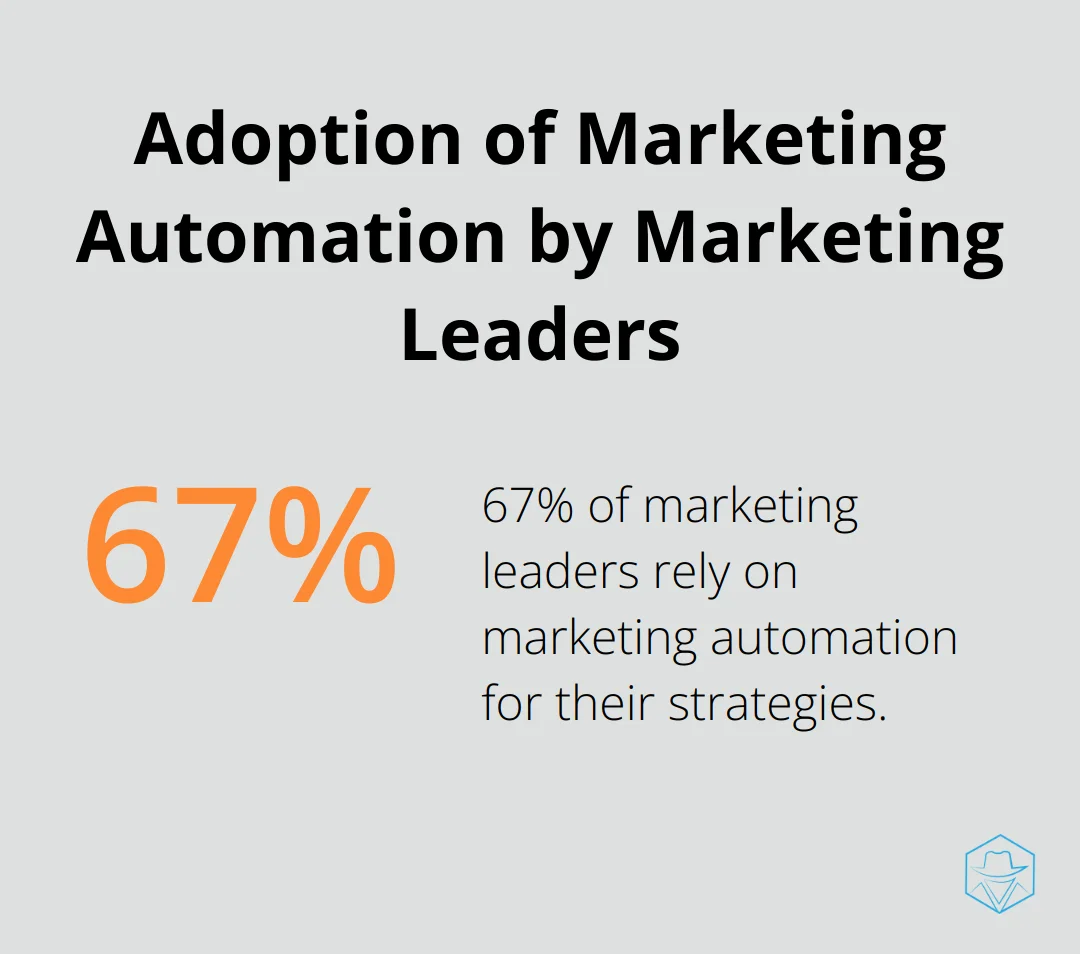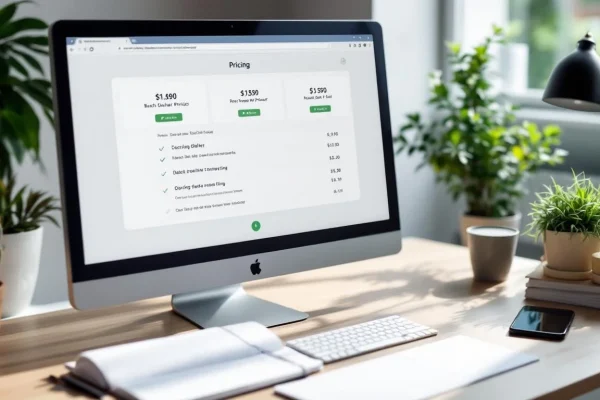Marketing Automation for SaaS: Boost Your Growth

Marketing automation for SaaS companies is a game-changer in today’s competitive landscape. At Drop Cowboy, we’ve seen firsthand how it can supercharge growth, streamline operations, and enhance customer experiences.
This powerful approach allows SaaS businesses to scale their marketing efforts efficiently, without the need for a massive team. In this post, we’ll explore the strategies, tools, and best practices that can help you harness the full potential of marketing automation for your SaaS company.
Why Marketing Automation Matters for SaaS
Marketing automation revolutionizes the SaaS landscape. It’s not about working harder; it’s about working smarter. The impact of automation on SaaS businesses is undeniable, with results that speak volumes.
Supercharging Lead Generation and Conversions
Marketing automation transcends simple email sending. It creates a comprehensive system that nurtures leads from their first brand interaction. A study by Annuitas Group revealed that businesses using marketing automation to nurture prospects experience a 451% increase in qualified leads. This substantial boost in lead quality directly translates to higher conversion rates.

Keeping Customers Happy and Reducing Churn
In the SaaS world, customer retention reigns supreme. Marketing automation helps maintain customer connections, providing timely, relevant information that fosters engagement. Invesp reports that attracting a new customer costs five times more than retaining an existing one. Automated personalized check-ins, feature updates, and usage tips (all tailored to individual user needs) can significantly reduce churn rates.
Scaling Without Breaking the Bank
One of the most compelling aspects of marketing automation for SaaS companies is the ability to scale marketing efforts without proportionally increasing headcount. A single marketer equipped with the right automation tools can manage campaigns that would traditionally require a team. This efficiency allows SaaS businesses to grow rapidly without the overhead of a large marketing department.
The Power of Personalization at Scale
Personalization has evolved from a nice-to-have to a must-have feature. Epsilon reports that 80% of consumers are more likely to make a purchase when brands offer personalized experiences. Marketing automation enables SaaS companies to deliver tailored messages to thousands of users simultaneously. This includes customized onboarding sequences and product recommendations based on usage patterns (among other personalized touchpoints).
As we move forward, it’s clear that marketing automation isn’t just a tool-it’s a strategic imperative for SaaS companies looking to thrive in today’s competitive landscape. Let’s explore the key strategies that can help you harness the full potential of marketing automation for your SaaS business.
Mastering SaaS Marketing Automation Strategies
Marketing automation empowers SaaS companies to accelerate growth and streamline operations. At Drop Cowboy, we’ve identified key strategies that can significantly boost your SaaS success. Let’s explore these game-changing tactics.
Score and Nurture Leads
Lead scoring forms the foundation of effective marketing automation. This process assigns points to leads based on their actions and characteristics, helping prioritize high-potential prospects and tailor your approach. For example, a lead who downloads a whitepaper and attends a webinar might score higher than one who only visits your pricing page.
Once scored, you can create targeted content journeys based on interests and engagement levels. A study by DemandGen Report found that nurtured leads produce, on average, a 20% increase in sales opportunities compared to non-nurtured leads.
Craft Targeted Email Campaigns
Email remains a powerful tool in the SaaS marketing arsenal. Targeted email drip campaigns guide prospects through your sales funnel with precision. These campaigns deliver a series of pre-written emails triggered by specific actions or timeframes.
For example, you might set up a sequence for new trial users:
- Day 1: Welcome email with getting started guide
- Day 3: Tips on key features
- Day 7: Case study showcasing success stories
- Day 14: Offer for a personalized demo
HubSpot reports that marketers who use segmented campaigns note as much as a 760% increase in revenue (underscoring the importance of tailoring your message to different audience segments).

Leverage Behavioral Triggers
Behavioral triggers elevate personalization. These automated messages or actions respond to specific user behaviors. For instance, if a user hasn’t logged in for a week, you might send a re-engagement email. Or if they’ve explored a particular feature, you could trigger a pop-up offering a tutorial.
Experian’s research shows that triggered email messages yield 8x more opens and clicks than traditional emails. This approach ensures your communication stays relevant and timely.
Automate Onboarding and Customer Success
A smooth onboarding process proves critical for SaaS companies. Automation can streamline this journey, ensuring new users quickly find value in your product. This might include automated welcome series, in-app guides, or triggered help resources based on user actions.
For ongoing customer success, try setting up automated check-ins at key milestones or usage thresholds. This proactive approach can significantly reduce churn. Bain & Company found that increasing customer retention rates by 5% increases profits by 25% to 95%.
Retarget and Recover Abandoned Carts
Don’t let potential customers slip away. Retargeting campaigns can re-engage users who’ve shown interest but haven’t converted. For SaaS companies, this might mean reaching out to users who started a free trial but didn’t upgrade to a paid plan.
Similarly, abandoned cart recovery (or in the SaaS world, abandoned signup recovery) can recapture lost opportunities. A timely, automated reminder often provides the nudge needed to complete the process. According to Baymard Institute, the average documented online shopping cart abandonment rate is 69.57% (highlighting the potential impact of recovery strategies).
Implementing these strategies requires the right tools and approach. While many options exist, Drop Cowboy offers a comprehensive platform that integrates seamlessly with your existing tech stack. Our solution allows you to implement these strategies efficiently and effectively, setting the stage for remarkable growth. Now, let’s explore the tools and platforms that can supercharge your SaaS marketing automation efforts.
Selecting the Right Marketing Automation Tools
Essential Features for SaaS Success
When you evaluate marketing automation platforms, you should prioritize tools that offer robust lead scoring capabilities, advanced segmentation options, and customizable workflow builders. These features form the backbone of effective SaaS marketing automation.
You need platforms that provide detailed analytics and reporting. The ability to track key metrics like customer acquisition cost (CAC), lifetime value (LTV), and churn rate is important for optimizing your marketing efforts. Salesforce reports that 67% of marketing leaders rely on marketing automation (highlighting its importance in today’s competitive landscape).

Integration capabilities are another critical factor. Your chosen platform should connect seamlessly with your CRM, customer support tools, and other essential SaaS applications. This integration ensures a smooth flow of data across your tech stack, enabling more accurate targeting and personalization.
Balancing Cost and ROI
While budget considerations matter, focusing solely on price can be short-sighted. Instead, you should evaluate the potential return on investment (ROI) each platform offers. A study by VentureBeat found that 80% of marketing automation users saw an increase in leads, with 77% seeing an increase in conversions.
You should consider platforms that offer flexible pricing models, allowing you to scale your investment as your business grows. Many providers offer tiered pricing based on the number of contacts or features used, making it easier to start small and expand over time.
User-Friendly Interface and Support
The ease of use of a marketing automation platform can significantly impact its adoption and effectiveness within your team. You should look for intuitive interfaces and comprehensive onboarding resources. A report by Ascend2 found that 63% of companies successful with marketing automation cite ease of use as a critical factor in their platform selection.
Additionally, you should consider the level of customer support provided. Responsive support can be invaluable when you troubleshoot issues or implement complex automation workflows. Try to find providers offering multiple support channels, including live chat, email, and phone support.
Top Choices in the Market
Several platforms stand out in the marketing automation space. HubSpot offers a comprehensive suite of tools, including CRM integration and content management. Marketo (now part of Adobe) provides advanced lead management and account-based marketing features. Mailchimp, known for its email marketing capabilities, has expanded to offer automation features suitable for small to medium-sized businesses.
However, Drop Cowboy emerges as a top choice, particularly for businesses looking to leverage voice and SMS in their marketing automation strategies. With features like Mimic AI™ for voice cloning and Smart Delivery™ for efficient global message delivery, Drop Cowboy offers unique capabilities that set it apart in the market.
Compliance and Security Considerations
As you select a marketing automation tool, you must not overlook compliance and security features. With regulations like GDPR and CCPA in place, you need a platform that helps you maintain data privacy and security standards. Look for tools that offer features such as data encryption, consent management, and audit trails.
Final Thoughts
Marketing automation for SaaS companies has become essential for success in today’s competitive landscape. These powerful tools and strategies significantly boost lead generation, improve conversion rates, and enhance customer retention. The ability to scale marketing efforts without increasing headcount allows SaaS companies to grow rapidly while maintaining efficiency.
Implementing marketing automation SaaS solutions requires a strategic approach. You must clearly define your goals and map out your customer journey to guide your automation efforts and align them with your business objectives. Focus on data quality and integration to create a unified view of your customers and power effective automation.
The future of marketing automation lies in AI, machine learning, and voice interfaces. Drop Cowboy offers cutting-edge features like Mimic AI™ for voice cloning and Smart Delivery™ for efficient global message delivery. Our platform combines ringless voicemail and SMS with advanced automation capabilities, helping businesses enhance their marketing efforts and drive growth.
blog-dropcowboy-com
Related posts

August 13, 2025
If a call goes straight to voicemail
Learn what it means if a call goes straight to voicemail. Discover reasons and tips on how Drop Cowboy’s tools might help manage your communications.

July 1, 2025
Batch Dialer Pricing: Find the Best Value for You
Explore batch dialer pricing and uncover the best value options. Save money while maximizing efficiency with our detailed analysis and practical tips.

June 27, 2025
Best Vonage Alternatives for Business Communication
Explore top alternative to Vonage for business communication with effective features, pricing, and benefits that suit your company’s needs.

July 20, 2025
TextMagic Review: Is It Worth Your Investment?
Explore TextMagic review to see if it’s a worthy investment. Discover its features, costs, and benefits to make an informed decision for your business.

June 2, 2025
High Level CRM: All-in-One Marketing Automation
Explore High Level CRM as an all-in-one solution for marketing automation. Streamline your marketing efforts with comprehensive tools and insights.

March 10, 2025
Top Free Text Marketing Platforms for Small Businesses
Explore top free text marketing platforms for small businesses to boost engagement and reach your audience effectively.